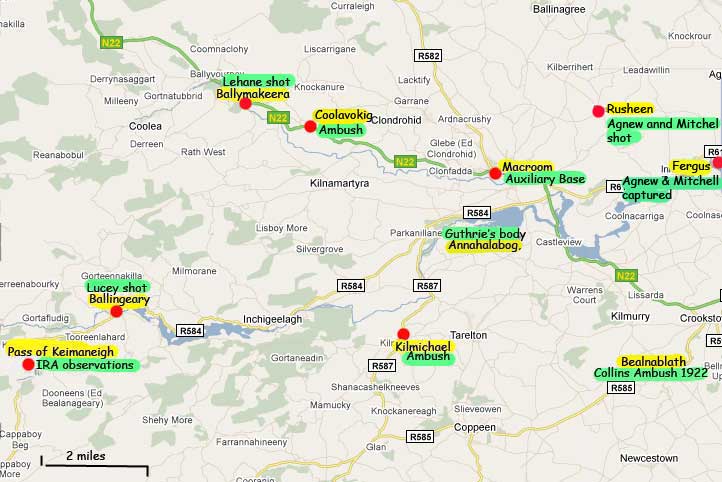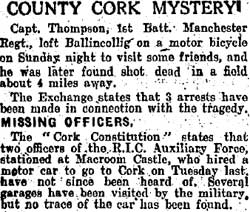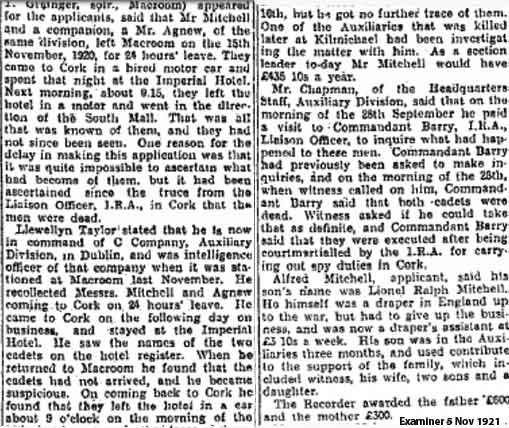

There are various slants on what may have happened to these two men who disappeared around 16 Nov 1920 between Imperial Hotel Cork and the ADRIC barracks at Macroom Castle. But I find it odd that not more was done by the British Government to recover the bodies during the truce or indeed afterwards. I feel that one has to put their death in the context of two shootings by the Auxiliaries of 2 Irish men -James Lehane (on 16 Oct 1920) and Christopher Lucey (on 10 Nov 1920).
James Lehane shot by Auxiliaries 16 Oct 1920
Christopher Lucey shot by Auxiliaries 10 Nov 1920

Mitchell and Agnew disappear 16 Nov 1920
RM Taylor stated at the Oct 1921 compensation case that the two men stayed overnight in the Imperial Hotel in Cork on 15th Nov, leaving at 9 am on the morning of 16th. That was last sighting that he could prove.
Cafferata states
The two chaps left the Castle one Friday for a weekend in Cork by car and that was the last we saw of them. They were wearing Mufti and both were carrying guns. On the following Tuesday the village showed signs that they knew something. Few men were about and the women were furtive and mostly kept indoors. A couple of days later a rumour got round that they had been held up on the Cork road by a crowd of IRA , kidnapped and held prisoner. A week went past and patrols scoured the countryside but no trace was found until quite by accident one of the patrols found the car on the edge of a bog up an old farm track. The car was burnt out. ....The CO said he was taking all possible steps to obtain information as to the fate of the two missing cadets. He kept his word, and by some amazing way got in communication with the local IRA commander and finally got to the truth. The two cadets had been executed, shot. We never found the bodies, to this day they lie buried in the bog somewhere between Macroom and Cork.
'The Burning of Cork' by Gerry White & Brendan O'Shea published in 2006, has on 6 November, two Auxiliary intelligence officers based in Macroom were abducted. Cadets Bertram Agnew and Lional R. Mitchell were in Johnson and Perrott's motor garage at Emmet Place when they were captured. They were subsequently taken to a secret location, interrogated, and shot dead.
"The Year of the Disappearances" says "they were snatched shortly after they left the Imperial Hotel in Cork"
This newspaper report says that Mitchell and Agnew were abducted together. Witness statements were made by WF Chapman of ADRIC HQ Staff (he was a staff officer DI3 based in Cork) and RM Taylor of C Coy


And an IRA report on activities by the Ballingeary Brigade compiled by Donal Cronin, Bawnatoumple from his uncle, John Cronins account of that period. . This account says:- We now received information that secret service men were to visit the area and a guard was mounted at the Pass of Keimaneigh for almost a month. One suspect was captured and held prisoner for a few days. However he proved innocent. He was a British Magistrate named Brady who was touring Ireland on a motor-bike. He was well treated and was released unharmed. The company had now acquired a motor-bike which proved invaluable for delivering dispatches and conveying officers to meetings etc.
On Wednesday, 10 November 1920, Black and Tans again raided Ballingeary. Twenty two year old Christopher Lucey (Section Commander, B. Company, 1st Battalion, Cork City) and late of Pembroke Street, had been on the run in the area all Summer and Autumn. He slept in a "béilic" south of the road, at Túirín Dubh but had his meals in Twomey's of Túirín Dubh. He spotted the approaching lorries and ran to the Twomey house to warn his companions. They had already left and when he ran from the rear of the house, he failed to follow the pre-arranged and often proved escape route. He came under heavy fire and was shot while crossing open ground near Carrig. He was unarmed. When the Tans returned to Macroom they entered the Market Bar and began to celebrate. They were toasting one man in particular and he described in detail how he had taken aim and fired the fatal shot. The barman, an ex R.I.C. man named Vaughan was able to identify him and he informed the Macroom volunteers. All companies were notified about this man and some time later he was again identified by volunteers in Cork City, when he signed his name to a docket, while ordering military stores. When he returned to collect his order he was taken prisoner and executed.
T/Cadet Cafferata in his account points the finger at a Cadet called Chichester [note Mitchell and Agnew disappeared on 16 Nov 1921, and Lucey was shot on 10th Nov 1921]
..nothing had been seen of him for about half an hour when he was seen going through the back door into the yard. At that moment two shots were heard outside - quite definitely pistol shots. For a few seconds everyone froze stiff, waiting for a further outbreak, but none came. Four of us went out into the road to investigate. About 20 yards up the road we found the missing cadet. He was standing over a figure which lay very still in the middle of the road. As we crowded round and asked what had happened, we saw that the Cadet had his .45 Colt in his hand. He said "I was searching the bastard and he made a break for it - I called on him to halt and he went on running so I shot him" We examined the figure on the road. He was dead alright- very dead. Somebody opened his coat and shirt, and said "something wrong here. He has two bullet holes, both in his chest. Have a look for yourselves" Sure enough the entrance holes were in his chest and not in his back. There was a pause, an uncomfortable one Then someone said "What is your explanation, Chichester? Why did you do this?" Chichester was truculent. He replaced the two empty shells in his Colt and said "What's all the bloody fuss about? He's a bloody Shinner isn't he? He is for one of those two poor buggers of ours that they murdered the other day. I will get another one before I am finished. We took Chichester's rifle and pistol from him
Cafferata goes on to say that the rest of the platoon wanted to carry out their own unofficial trial of Chichester, but someone (later Gutherie owned up) told the platoon commander, and Chichester was removed to Dublin Castle "Chichester was discharged from the force and sent back to England but the IRA tracked him down to London where he had got a job as a bus conductor and quietly bumped him off"